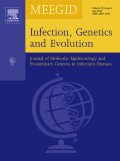
INFECTION GENETICS AND EVOLUTION
Scope & Guideline
Bridging Molecular Genetics and Infectious Disease Insights
Introduction
Aims and Scopes
- Genomic Epidemiology:
Research that employs genomic techniques to trace the transmission dynamics and evolutionary patterns of infectious diseases, helping to inform public health responses. - Antimicrobial Resistance:
Studies investigating the genetic basis of antimicrobial resistance in various pathogens, including bacteria and viruses, addressing the global health threat posed by resistant strains. - Phylogenetic Analysis:
Utilization of phylogenetic methods to study the evolutionary relationships among pathogens, aiding in the identification of transmission pathways and potential zoonotic sources. - Pathogen Genomics:
Comprehensive genomic analyses of pathogens to understand their genetic diversity, virulence factors, and host interactions, contributing to vaccine and therapeutic development. - Zoonotic Disease Research:
Explorations of the genetic factors that facilitate the transmission of diseases from animals to humans, focusing on the evolutionary adaptations of pathogens in various hosts. - Vaccine Development and Evaluation:
Research dedicated to the identification of novel vaccine candidates through genomic and immunoinformatic approaches, aiming to enhance vaccine efficacy against infectious diseases. - Microbiome Studies:
Investigations into the role of host-associated microbiomes in influencing infection outcomes and pathogen dynamics, providing insights into host-pathogen interactions.
Trending and Emerging
- Metagenomics and Environmental Pathogen Studies:
There is a growing interest in metagenomic approaches to study environmental and zoonotic pathogens, reflecting the need to understand the complex interactions within ecosystems and their impact on human health. - COVID-19 Research:
Following the global pandemic, there has been a significant uptick in studies related to SARS-CoV-2, focusing on its genetic variants, transmission dynamics, and implications for public health and vaccine development. - Host-Pathogen Interactions:
Emerging research is increasingly focused on the genetic and molecular interactions between hosts and pathogens, providing insights into disease susceptibility and resistance mechanisms. - CRISPR and Genome Editing Technologies:
The application of CRISPR and other genome editing technologies in infectious disease research is on the rise, highlighting innovative strategies for pathogen control and vaccine development. - Antimicrobial Stewardship and Resistance Mechanisms:
There is heightened emphasis on understanding the genetic mechanisms behind antimicrobial resistance, particularly in the context of clinical isolates, to inform stewardship practices and treatment guidelines. - Genomic Surveillance and Public Health:
The trend towards using genomic surveillance as a tool for monitoring infectious diseases and informing public health responses is increasingly prominent, particularly in tracking outbreaks and understanding pathogen evolution.
Declining or Waning
- Traditional Diagnostic Methods:
There is a noticeable reduction in studies focusing on conventional diagnostic techniques, as the field shifts towards molecular and genomic methodologies that offer greater sensitivity and specificity. - Epidemiological Studies without Genetic Component:
Research articles that solely focus on epidemiological data without integrating genetic analysis are becoming less frequent, indicating a shift towards more comprehensive studies that incorporate genetic insights. - Single-Pathogen Focus Studies:
Research that examines individual pathogens in isolation is declining, with a growing preference for studies that consider multi-pathogen interactions and the broader ecological context of infectious diseases. - Basic Virology and Bacteriology:
The journal has seen fewer articles centered on classical virology and bacteriology, as the emphasis has moved towards molecular genetics and evolutionary studies that provide deeper insights into pathogen behavior.
Similar Journals

PHYTOPATHOLOGY
Empowering researchers to combat plant diseases.PHYTOPATHOLOGY, published by the American Phytopathological Society, is a premier journal dedicated to advancing the science of plant pathology. With an ISSN of 0031-949X and E-ISSN 1943-7684, this journal has been a cornerstone of scholarly communication in the field since its inception in 1946. Ranked in the top quartile (Q1) in both Agronomy and Crop Science and Plant Science for 2023, PHYTOPATHOLOGY has garnered notable recognition with Scopus ranks placing it at #86/516 (83rd percentile) in Plant Science and #69/406 (83rd percentile) in Agronomy and Crop Science. The journal publishes high-quality research articles, reviews, and case studies that explore innovative solutions to plant diseases, thereby supporting agricultural productivity and sustainability. While currently not an open-access journal, it offers vital insights and findings that are invaluable to researchers, professionals, and students aiming to advance their knowledge and contribute to the field of plant sciences.

ACTA VETERINARIA-BEOGRAD
Championing open-access research for veterinary excellence.ACTA VETERINARIA-BEOGRAD is a distinguished academic journal dedicated to the field of veterinary science, focusing on a broad spectrum of topics pertinent to veterinary medicine and animal health. Published by SCIENDO, this journal has been an open-access resource since 2014, facilitating the dissemination of valuable research findings and innovations to a global audience. With an ISSN of 0567-8315 and an E-ISSN of 1820-7448, it plays a critical role in promoting accessible knowledge in veterinary practices while contributing to the advancement of the field. Located in Poland, this journal notably ranks in the Q3 quartile for veterinary studies, reflecting its ongoing commitment to quality and relevance. The journal welcomes contributions from a diverse range of veterinary disciplines, making it a vital platform for researchers, practitioners, and students alike who aspire to advance their understanding and impact within the veterinary community.

GENETICS AND MOLECULAR RESEARCH
Exploring Genetic Mechanisms for a Brighter FutureGENETICS AND MOLECULAR RESEARCH is a distinguished academic journal published by FUNPEC-EDITORA, focusing on the rapidly evolving fields of genetics and molecular biology. Since its inception in 2002, the journal has provided a platform for high-quality research and advancements that contribute to our understanding of genetic mechanisms and molecular interactions. With an impressive convergence period extending through 2024, this open-access journal presents vital insights while maintaining accessibility for researchers, professionals, and students alike. Though currently positioned in the Q4 quartile in Genetics, Medicine (Miscellaneous), and Molecular Biology as per the latest 2023 rankings, its persistent publication efforts aim to elevate its influence within the academic community. Researchers are invited to explore groundbreaking studies that may inform future developments in these critical scientific domains.
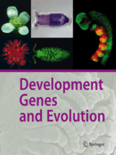
DEVELOPMENT GENES AND EVOLUTION
Exploring the Genetic Roots of Development and Evolution.DEVELOPMENT GENES AND EVOLUTION is a prominent academic journal published by Springer, dedicated to advancing the fields of developmental biology and genetics. With an ISSN of 0949-944X and an E-ISSN of 1432-041X, this journal plays a crucial role in disseminating high-quality research that explores the genetic underpinnings of developmental processes across various organisms. Located in the United States, the journal has maintained a strong international presence with a significant impact factor, reflecting its importance in the scientific community. It currently holds a Q3 ranking in both developmental biology and genetics, according to the latest 2023 category quartiles, indicating a solid standing among peers. With a convergence of insights from 1996 to 2024, the journal publishes original articles, reviews, and research notes that attract a diverse readership of researchers, professionals, and students. Access options include traditional subscription models and open access, ensuring that vital research is available to a broad audience. By fostering discussions on the evolution of developmental mechanisms, DEVELOPMENT GENES AND EVOLUTION continues to be an essential resource for those interested in understanding the intricate interplay between genetics and development.
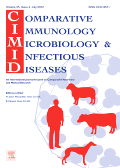
COMPARATIVE IMMUNOLOGY MICROBIOLOGY AND INFECTIOUS DISEASES
Advancing Knowledge in Immunology and MicrobiologyComparative Immunology Microbiology and Infectious Diseases, published by Elsevier Science Ltd, is a prominent journal dedicated to advancing the fields of immunology, microbiology, infectious diseases, and veterinary sciences. Established in 1978, this journal has become a vital resource for researchers and professionals alike, with a commendable impact factor that reflects its significance in academia. The journal, available in both print and electronic formats (ISSN: 0147-9571, E-ISSN: 1878-1667), stands out for its commitment to disseminating innovative research findings, particularly through its categorization in Q2 and Q3 quartiles across various related disciplines as of 2023. The journal aims to provide insightful comparative analyses that enhance our understanding of host-pathogen interactions, immune responses, and disease manifestations. With a global readership base, it serves as a platform for collaborative discourse among scientists and professionals, ultimately contributing to the improvement of health outcomes worldwide.
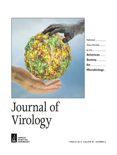
Journal of Virology
Shaping the Future of Viral TherapeuticsJournal of Virology is a premier scholarly journal dedicated to advancing the field of virology, focusing on the molecular mechanisms of virus-host interactions, viral pathogenesis, and the latest therapeutic and vaccine developments. Published by the American Society for Microbiology, this esteemed journal has been a cornerstone for researchers since its inception in 1967, providing a platform for high-quality, peer-reviewed research. With a commendable impact factor indicative of its relevance and influence, the journal is categorized in the top quartile (Q1) for Virology, Microbiology, and Insect Science, reflecting its significance in these fields. Researchers can access a wealth of studies and findings that shape our understanding of viruses and their interactions with hosts, highlighting its role in both basic and applied sciences. Positioned in the United States, the Journal of Virology serves a global audience, ensuring that cutting-edge discoveries reach professionals, students, and academics alike. Join the conversation as we explore the complexities of virology and its implications for human health and disease.

Molecular Genetics Microbiology and Virology
Unraveling the Mysteries of Infectious DiseasesMolecular Genetics Microbiology and Virology is an esteemed academic journal published by PLEIADES PUBLISHING INC, specializing in the complex interplay of genetics, microbiology, and virology. Established in 2007, this journal serves as a crucial platform for researchers and professionals committed to advancing our understanding of infectious diseases and molecular biology. Despite its current categorization in Q4 across several fields, the journal aims to evolve and foster significant discourse within the scientific community. While not an open access journal, it provides essential insights and high-quality research articles that contribute to the body of knowledge in molecular genetics and related disciplines. Located in the vibrant research landscape of New York, USA, the journal also encourages new submissions that address cutting-edge research topics and emerging trends in infectious diseases, thereby appealing to both emerging scholars and seasoned experts alike.

GENETICS AND MOLECULAR BIOLOGY
Exploring the DNA of innovation in research.GENETICS AND MOLECULAR BIOLOGY, published by the SOC BRASIL GENETICA, is a prominent journal dedicated to the advancement of knowledge in the fields of genetics and molecular biology. Since its inception in 1998, this Open Access journal has served as a vital platform for researchers, professionals, and students to disseminate their findings and engage with the latest innovations and discoveries. With an impact factor that reflects its growing influence, GENETICS AND MOLECULAR BIOLOGY ranks in the Q3 category for both genetics and molecular biology as of 2023, indicating its position within the academic community. The journal is indexed in Scopus, highlighting its commitment to maintaining rigorous peer-review standards while providing wide-reaching access to quality research. Operating out of Ribeirão Preto, Brazil, it fosters a collaborative environment for academic discourse and research development not only in Brazil but also globally. The journal encourages submissions that explore a wide range of topics in genetics and molecular biology, making it an essential resource for anyone involved in these dynamic fields.
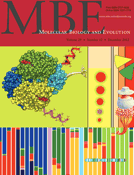
MOLECULAR BIOLOGY AND EVOLUTION
Advancing Knowledge in Genetics and EvolutionMOLECULAR BIOLOGY AND EVOLUTION, published by Oxford University Press, stands as a premier journal in the fields of molecular biology, evolutionary biology, and genetics. With a proud history dating back to its inception in 1983, the journal spans a convergence period through 2024, providing an exceptional platform for disseminating high-quality research. The journal is recognized in the top Q1 quartile across multiple categories, including Ecology, Evolution, Behavior and Systematics, and Genetics, reflecting its significant impact and relevance in these disciplines. With impressive Scopus rankings—10th in Ecology and Evolution, 12th in Genetics, and 22nd in Molecular Biology—it serves as a vital resource for scholars aiming to stay informed on cutting-edge developments in evolutionary processes and molecular genetics. While it currently does not offer open access, its curated contents resonate well with an audience of researchers, professionals, and students deeply interested in accelerating their understanding of the complexities of life through an evolutionary lens.

Virus Evolution
Unlocking the mysteries of viral dynamics and evolution.Virus Evolution is a premier open access journal published by Oxford University Press, dedicated to advancing the understanding of viral dynamics and evolutionary trends. Established in 2015, it has quickly ascended to a leading position in the fields of Microbiology and Virology, achieving a remarkable Q1 ranking in both categories for 2023. With its impactful research output, it ranks #27 out of 182 in Microbiology and #15 out of 80 in Virology, placing it in the top percentiles of the Scopus rankings. The journal serves as a vital resource for researchers, professionals, and students, providing a platform for the dissemination of innovative research that explores the genetic and ecological aspects of viruses. By embracing an open access model, Virus Evolution ensures that its high-quality content is accessible to a global audience, fostering collaboration and enhancing the impact of virology research worldwide.